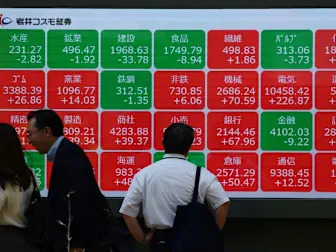
Shares rise, dollar struggles as investors consider tariff truce
By Rocky Swift
TOKYO (Reuters) - Stocks climbed in Asia on Wednesday while the dollar wobbled as relatively benign U.S. inflation data kept alive the prospect of rate cuts by the Federal Reserve later this year even as investors were still gauging if the worst of the trade conflicts were over.
As U.S. President Donald Trump's global trade war appeared to hit pause, led by a truce in the tariff spat between China and the United States, financial markets remained nervous about the outlook.
"I'm just a little bit cautious here about chasing the rally in stocks at this level," said IG analyst Tony Sycamore.
"We've got to wait to see what happens with regards to headlines and the framework around further tariff negotiations with other countries, but you know at this point of time the worst-case scenario has been priced out."
MSCI's broadest index of Asia-Pacific shares outside Japan was 1.1% higher after U.S. stocks climbed back into positive territory for the year, erasing losses triggered by Trump's chaotic rollout of sweeping tariffs.
Hong Kong's Hang Seng index jumped 1.4%, lifted by tech stocks after Chinese e-commerce retailer JD.com posted strong results. Investor focus this week will be on earnings from Tencent and Alibaba.
Equity futures pointed to retreats in European markets and a flat day on Wall Street.
Data overnight showing softer-than-expected U.S. consumer inflation also provided some relief to investors worried about the inflationary impact of U.S. tariff policies, which had severely undercut expectations of near term Fed rate cuts.
Though traders expect inflation to pick up as tariffs lift import costs, the uncertainty over the outlook remains as Washington moves ahead to strike deals with its trading partners.
Global sentiment turned up after a trade deal with the U.S. and Britain last week, and improved further when U.S. and China said on Monday they would pause their trade war for 90 days, bringing down reciprocal duties and removing other measures while they negotiate a more permanent arrangement.
Trump in an interview on Tuesday said he could see himself dealing directly with Chinese President Xi Jinping on details of a trade pact. His touted "potential deals" with India, Japan and South Korea are still pending.
"We have lingering headwinds and uncertainty when it comes to trade negotiations with other economies and we still have a 90 day deadline hanging over U.S.-China trade relations," said Frederic Neumann, chief Asia economist at HSBC.